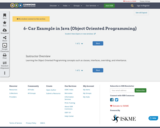
Learning the Object Oriented Programming concepts such as classes, interfaces, overriding, and inheritance.
- Subject:
- Computer Science
- Material Type:
- Full Course
- Author:
- Saeid Samadidana
- Date Added:
- 08/30/2022

Learning the Object Oriented Programming concepts such as classes, interfaces, overriding, and inheritance.

This module takes its name from The Other America by Michael Harrington, a study of 1950s U. S. poverty. From the 1700s, many American white people of European heritage have lacked the land, education, skills, or opportunities for advancement. White identity movements have drawn on regionalism, clannishness, racism, xenophobia, fear, and class resentments. With economic distress, movements have coalesced around feelings that the country is not working for them. Poor and working class whites gave impetus to Populism and insurgent “white identity” movements supporting Huey Long, George Wallace, and recently Donald Trump.Another important element is “race” -- a word and concept developed to justify the colonization and control (and enslavement) of black Africans by white Europeans and Americans. They used fake “race” science to justify colonization, the slave trade and subordination of Blacks.A complete, objective history requires an understanding of Americans who join in such identity politics.

Biology is designed for multi-semester biology courses for science majors. It is grounded on an evolutionary basis and includes exciting features that highlight careers in the biological sciences and everyday applications of the concepts at hand. To meet the needs of today’s instructors and students, some content has been strategically condensed while maintaining the overall scope and coverage of traditional texts for this course. Instructors can customize the book, adapting it to the approach that works best in their classroom. Biology also includes an innovative art program that incorporates critical thinking and clicker questions to help students understand—and apply—key concepts.
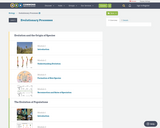


By the end of this section, you will be able to:Discuss the need for a comprehensive classification systemList the different levels of the taxonomic classification systemDescribe how systematics and taxonomy relate to phylogenyDiscuss the components and purpose of a phylogenetic tree

Black feminist health science studies is a critical intervention into a number of intersecting arenas of scholarship and activism, including feminist health studies, contemporary medical curriculum reform conversations, and feminist technoscience studies. We argue towards a theory of Black feminist health science studies that builds on social justice science, which has as its focus the health and well-being of marginalized groups. Students will engage feminist science theories such as the linguistic metaphors of the immune system, the medicalization of race, and critiques of the sexual binary. We will use contemporary as well as historical moments to investigate the evolution of “scientific truth” and its impact on the U.S. cultural landscape.

Interdisciplinary survey of people of African descent that draws on the overlapping approaches of history, literature, anthropology, legal studies, media studies, performance, linguistics, and creative writing. This course connects the experiences of African-Americans and of other American minorities, focusing on social, political, and cultural histories, and on linguistic patterns.
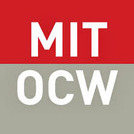
Interdisciplinary survey of people of African descent that draws on the overlapping approaches of history, literature, anthropology, legal studies, media studies, performance, linguistics, and creative writing. This course connects the experiences of African-Americans and of other American minorities, focusing on social, political, and cultural histories, and on linguistic patterns.
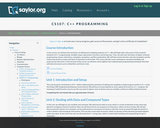
The student will learn the mechanics of editing and compiling a simple program written in C++ beginning with a discussion of the essential elements of C++ programming: variables, loops, expressions, functions, and string class. Next, the student will cover the basics of object-oriented programming: classes, inheritance, templates, exceptions, and file manipulation. The student will then review function and class templates and the classes that perform output and input of characters to/from files. This course will also cover the topics of namespaces, exception handling, and preprocessor directives. In the last part of the course, the student will learn some slightly more sophisticated programming techniques that deal with data structures such as linked lists and binary trees. Upon successful completion of this course, students will be able to: Compile and execute code written in C++ language; Work with the elementary data types and conditional and iteration structures; Define and use functions, pointers, arrays, struct, unions, and enumerations; Write C++ using principles of object-oriented programming; Write templates and manipulate the files; Code and use namespaces, exceptions, and preprocessor instructions; Write a code that represents linked lists and binary trees; Translate simple word problems into C++ language. (Computer Science 107)
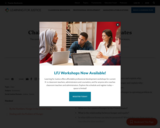
The 2008 data surprised people because it showed much more hunger than in previous years. In this lesson, students will learn about some of the report’s findings.

Using film as a lens to explore and interpret various aspects of the urban experience in both the U.S. and abroad, this course presents a survey of important developments in urbanism from 1900 to the present day, including changes in technology, bureaucracy, and industrialization; immigration and national identity; race, class, gender, and economic inequality; politics, conformity, and urban anomie; and planning, development, private property, displacement, sprawl, environmental degradation, and suburbanization.
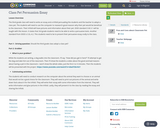
The third grade class will need to write an essay and a trifold persuading the students and the teacher to adopt a class pet. The students will need to use the computer to reasearch good reasosn why their pet would be beneficial to the classroom. Their trifold will have pictures and information about their pet. IDOE standard 3.W.3.1 will be taught with this lesson. It states that 3rd grade students need to be able to write a persuasive texts. Another standard from IDOE is 3.SL.4.2. This students need to be to present their persuasive essay orally to the class. Part 1: Driving question: Should the third grade class adopt a class pet? Part 2: GrabberWhat is your grabber?While the students are writing, a dog walks into the classroom. I’ll say. “How did you get in here?” I’ll attempt to get the dog and take him out of the classroom. Then I’ll show the students a video about the good and bad reasons about having a pet in the classroom. I won’t show the whole video, just the first 3 or 4 minutes. Then the students will be presented with the project. https://www.youtube.com/watch?v=vbwiYOA-RcY Culminating activities: The students will need to conduct research on the computer about the animal they want to choose or an animal that would not be a good choice for the classroom. They will need to print out pictures of the animal and write down facts about it for the trifold. They will write their essay with some information from the internet. They will write information and glue pictures in the trifold. Lastly, they will present it to the class by reading the essay and sharing the trifold.

Roman Literature of the Golden Age of Augustus Caesar, produced during the transition from Republican to Imperial forms of government, was to have a profound and defining influence on Western European and American societies. These writings ultimately established lasting models of aesthetic refinement, philosophical aspiration, and political ambition that continue to shape modern cultures. This class will be exploring the Golden Age of Latin Literature from an historical perspective in order to provide an intensive examination of the cultural contexts in which these monumental works of classical art were first produced. Readings will emphasize the transition from a Republican form of government to an Empire under the rule of Augustus Caesar and the diversity of responses among individual authors to the profound structural changes that Roman society was undergoing at this time. Particular attention will be devoted to the reorganization of society and the self through textuality, the changing dimensions of the public and the private, the roles of class and gender, and the relationship between art and pleasure. Writings covering a wide variety of literary genres will include the works of Caesar, Cicero, Catullus, Livy, Virgil, Horace, and Ovid, with additional readings from Cassius Dio for background.

This class, required of all Master of Architecture students, presents a critical review of works, theories, and polemics in architecture in the aftermath of World War II. The aim is to present a historical understanding of the period, and to develop a meaningful framework to assess contemporary issues in architecture. Special attention will be paid to historiographic questions of how architects construe the terms of their “present.”
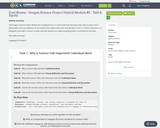
The Oregon Science Project Module #2 is designed for K-12 and nonformal educators who want to learn more about NGSS, with an emphasis on the central role student discourse and talk play in the K-12 NGSS classroom. It is designed to provide 3-4 hours of work and asks learners to create something new to contribute to the work.Who talks and why?Engaging All Students
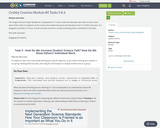
The Oregon Science Project Module #2 is designed for K-12 and nonformal educators who want to learn more about NGSS, with an emphasis on the central role student discourse and talk play in the K-12 NGSS classroom. It is designed to provide 3-4 hours of work and asks learners to create something new to contribute to the work.Who talks and why?Engaging All Students
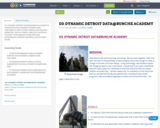
D3: DYNAMIC DETROIT DATA@ BUNCHE ACADEMY IS A RESOURCE FOR STUDENTS, PARENTS AND TEACHERS TO USE TO FIND CURRICULUM RELATED WEBSITES. THIS IS A USEFUL ONE STOP LOCATION TO START YOUR SEARCH TO RELATED AGE APPROPRIATE CONTENT MATERIAL FOR STUDENT WORK.

Democracy in difference: Debating key terms of gender, sexuality, race and identity focuses on concepts and analytical frames we use when discussing how marginalised identities navigate their place in an assumed common culture.
This ebook offers a path for exploring how we might build a shared vocabulary when working through the muddle of public debates like identity politics, political correctness, pronouns and what constitutes racism. Democracy in Difference is an unconventional interdisciplinary guide to key concepts, which borrows from decolonial methodologies, Marxism, feminism, queer theory and deconstruction.
Key terms are illustrated through written text, La Trobe Art Institute artworks (centering Indigenous artists), poetry, comedy and song, and customised animations which make difficult terms accessible.
This text is published by the La Trobe eBureau.
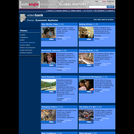
This is a collection of downloadable video clips on the theme of Economic Systems, with guiding questions for students. Clips are drawn from the following PBS WIDE ANGLE documentaries: "To Have and Have Not" (2002), "A State of Mind" (2003), "Ladies First" (2004), "1-800-INDIA" (2005), "Border Jumpers" (2005).